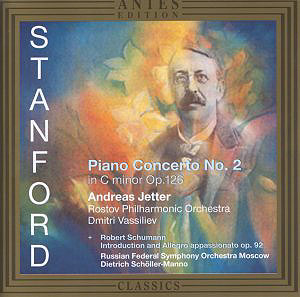
Distributors
USA:
QUALITON IMPORTS ltd:
24-02 40th Ave,
Long Island, N.Y. 11101
Great Britain:
KINGDOM RECORDS LTD:
Elstree Business Centre
Elstree Way, Borhamwood
GB-Herts WD6 1RX
Charles Villiers STANFORD (1852-1924)
Piano Concerto No. 2 in C minor Op. 126 (1911) [38.55]
Robert SCHUMANN (1810-1856)
Introduction and Allegro Appassionato (Konzertstück)
Op. 92 (1849) [14.54]
Andreas Jetter (piano)
![]() Rostov Philharmonic Orchestra/Dmitri
Vassiliev (Stanford)
Rostov Philharmonic Orchestra/Dmitri
Vassiliev (Stanford)
Russian Federation Symphony Orchestra Moscow/Dietrich Schöller-Manno
rec. 27-28 April 2002, Rostov State Philharmonic Hall (Stanford); 19-20
May 2001, Moscow Broadcast Station Studio 5 (Schumann)
![]() ANTES EDITION BM-CD
31.9186 [54.11]
ANTES EDITION BM-CD
31.9186 [54.11]
AVAILABILITY
Bella Musica Edition
D-77815 Bühl, Baden, Germany